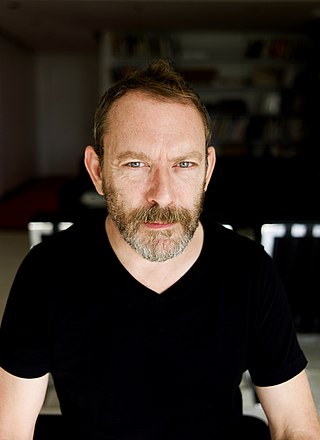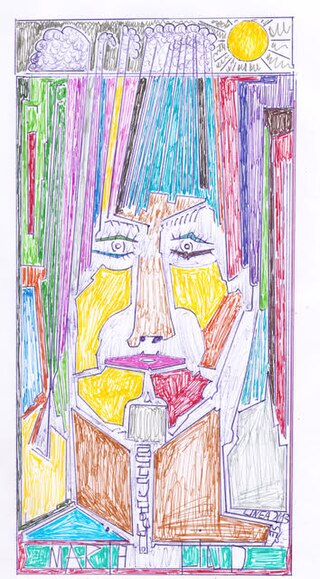Related Research Articles
Marjetica Potrč is an artist and architect based in Ljubljana, Slovenia. Potrč's interdisciplinary practice includes on-site projects, research, architectural case studies, and drawings. Her work documents and interprets contemporary architectural practices and the ways people live together. She is especially interested in social architecture and how communities and governments can work together to make stronger, more resilient cities. In later projects, she has also focused on the relationship between human society and nature, and advocated for the rights of nature.

Liam Gillick is a British artist who lives and works in New York City. Gillick deploys multiple forms to make visible the aesthetics of the constructed world and examine the ideological control systems that have emerged along with globalization and neoliberalism. He utilizes materials that resemble everyday built environments, transforming them into minimalist abstractions that deliver commentaries on social constructs, while also exploring notions of modernism.
Bidoun is a non-profit organization focused on art and culture from the Middle East and its diasporas. Bidoun was founded as a print publication and magazine in 2004 by Lisa Farjam, eventually expanding to online publishing and curatorial projects. The print edition of the magazine was in publication from spring 2004 until spring 2013.

Beatriz Colomina is an architecture historian, theorist and curator. She is the founding director of the Program in Media and Modernity at Princeton University, the Howard Crosby Butler Professor of the History of Architecture and director of graduate studies in the School of Architecture.
muf is a collaborative of artists, architects and urban designers based in London, England, specialising in the design of the urban public realm to facilitate appropriation by users.

Joachim Sauter was a German media artist, designer and technology entrepreneur. He was appointed Professor for New Media Art and Design at the Universität der Künste Berlin, UdK in 1991, and in 1993 he created Terravision, before pursuing a lawsuit against Google for infringing the patent. He became an adjunct professor at UCLA, Los Angeles in 2001.

Keller Easterling is an American architect, urbanist, writer, and professor. She is Enid Storm Dwyer Professor and Director of the MED Program at Yale University.

Eyal Weizman MBE FBA is a British Israeli architect. He is the director of the research agency Forensic Architecture at Goldsmiths, University of London where he is Professor of Spatial and Visual Cultures and a founding director there of the Centre for Research Architecture at the department of Visual Cultures. In 2019 he was elected Fellow of the British Academy.
Decolonizing Architecture Art Residency (DAAR) is an architectural studio, collective of architects and a residency program based in Beit Sahour, Palestine. DAAR was established to work on complex architectural problems in a region with strongly conflicting political forces, and is related to the Decolonizing Architecture Art Research collective.
Kathrin Böhm is an artist who is operating in and outside of the art world.

Matthias Böttger is a German architect and curator.
Shumon Basar is a British writer, editor and curator.

Armen Avanessian is an Austrian philosopher, literary theorist, and political theorist. He has taught at the Free University of Berlin, among other institutions, and held fellowships in the German departments of Columbia University and Yale University. His work on Speculative realism and Accelerationism in art and philosophy has found a wide audience beyond academia.
The term ‘critical spatial practice’ refers to forms of practice between art and architecture. Jane Rendell introduced the term in 2003. Rendell later consolidated and developed the term as one that defined practices located at a three-way intersection: between theory and practice, public and private, and art and architecture. For Rendell, critical spatial practice is informed by Michel de Certeau’s The Practice of Everyday Life, and Henri Lefebvre’s The Production of Space, as well as the critical theory of the Frankfurt School, but her definition aims to transpose the key qualities of critical theory – self-reflection and social transformation – into practice. In Rendell’s work, critical spatial practices are those that question and transform the social conditions of the sites into which they intervene, as well as test the boundaries and procedures of their own disciplines.
Jane Rendell is an architectural historian, cultural critic and art writer. She has taught at Chelsea College of Art and Design, Winchester School of Art, and the University of Nottingham. She has been based at the Bartlett School of Architecture at UCL since 2000, where she has been Professor of Architecture and Art since 2008, teaching primarily across the Situated Practice, Architectural History and PhD programmes. She was Director of Architectural Research (2004–10) and Vice Dean Research (2010-3). She is currently Director of Architectural History and Theory and leads the Bartlett’s Ethics Commission.

Wolfgang Ernst is a German media theorist. He is Professor for Media Theories at Humboldt University of Berlin and a major exponent of media archaeology as a method of scholarly inquiry.
Elke Krasny is a cultural and architectural theorist, urban researcher, curator, and author. Her work specializes in architecture, contemporary art, urbanism, feminist museology, histories and theories of curating, critical historiographies of feminism, politics of remembrance, and their intersections. Krasny received her Ph.D. from the University of Reading. She is Professor of Art and Education at the Academy of Fine Arts Vienna. She worked as a visiting professor at the University of Bremen and the Academy of Fine Arts Nuremberg. In 2012 she was visiting scholar at the Canadian Centre for Architecture CCA, Montréal. In 2014, she was City of Vienna Visiting Professor at the Interdisciplinary Centre for Urban Culture and Public Space (SKuOR) at the Vienna University of Technology. Using the framework of political care ethic developed by Joan Tronto, Krasny works on developing a perspective of critical care for architectural and urban practice and theory. In 2019, together with Angelika Fitz she edited Critical Care. Architecture and Urbanism for a Broken Planet.
Hila Peleg is an international curator and filmmaker and the Dean of HaMidrasha – Faculty of the Arts starting September 2023. Peleg has curated solo shows, large-scale group exhibitions and interdisciplinary cultural events across the visual arts, film and architecture, in public institutions throughout Europe and internationally. She is also known for her documentary film work including her award winning feature film "A Crime Against Art" from 2007 and "Sign Space" from 2016.

Maria Lind is a curator, writer and educator from Stockholm. Since 2023, Lind is the director of Kin Museum of Contemporary Art in Giron/Kiruna. From 2020 to 2023, she served as the counsellor of culture at the embassy of Sweden in Moscow. Prior to that, she was the director of Stockholm’s Tensta Konsthall, the artistic director of the 11th Gwangju Biennale, the director of the graduate program at the Center for Curatorial Studies, Bard College, the director of IASPIS in Stockholm and the director of Kunstverein München, Munich.
Sandi Hilal is a Palestinian architect, writer, and researcher. Hilal was Head of the Infrastructure and Camp Improvement Program in the West Bank at UNRWA from 2008 to 2014.
References
- ↑ "Cultures of Assembly".
- ↑ "Crossbenching – Interview with Markus Miessen". Common Journal für Kunst & Öffentlichkeit.
- ↑ "Markus Miessen Back to the future #30". Klat Magazine. 20 September 2013.
- ↑ "Werdet politischer, Architekten!". Der Standard.
- ↑ "Staff card". University of Gothenburg. 22 December 2016. Retrieved 12 November 2018.
- ↑ "News from the Architectural Association" (PDF). ISSUE 4/SUMMER 2007.
- ↑ "Re: Participation – Markus Miessen and David Goldenberg". Fillip 10 – Fall 2009.
- ↑ Grosse, Julia (3 April 2009). "Trend zum vollen Haus". taz.de.
- ↑ "Markus Miessen". DLD Conference.
- ↑ "Studio Miessen – 19 Hours at the Kiosk". Haus der Kulturen der Welt. February 2018.
- ↑ "Performa Hub by nOffice". dezeen magazine. 22 November 2009.
- ↑ "Markus Miessen". Biennale of Sydney.
- ↑ "The Dilemma of Instrumentalization(or: From which Position is one talking?)" (PDF). tarynsimon.com.
- ↑ "Ausstellungseröffnung, "Stealth Architecture", 7. Februar 2013, 19 Uhr/ 7th February 2013, 7 pm". Weltkulturen Museum.
- ↑ "Join the Brutally Early Club". Paddle8.
- ↑ "Obrist and Miessen at the Brutally Early Club". Ecole Du Magasin.
- ↑ "Brutally Early Club". brutallyearlyclub.org.
- ↑ "Markus Miessen Back to the future #30". Markus Miessen: Crossbenching.
- ↑ Miessen, Markus; Grassegger, Hannes (26 June 2012). "Albtraum Partizipation". Zeit Online.
- ↑ "Podiumsdiskussion 02.07 Critical Spatial Practice – Nikolaus Hirsch, Markus Miessen und Eyal Weizman im Gespräch". Hamburger Architektur Sommer 2015.
- ↑ "Beyond the Nostalgia of Political Spatial Practice". ment Journal.
- ↑ "Sunday Sessions hosted by Nikolaus Hirsch & Markus Miessen in collaboration with Pin-Up magazine". MoMA PS1.
- ↑ "Markus Miessen: The Uninvited Outsider". Rupert.
- ↑ "Cultures of Assembly | the MIT Press".